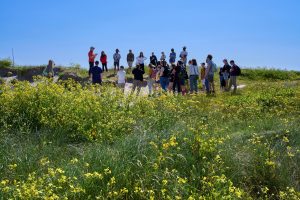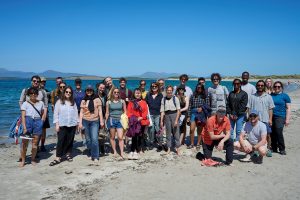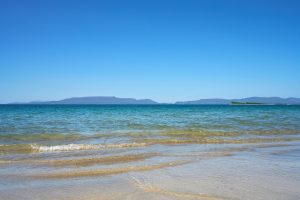9 Climate, Coasts and Communities: Experiences of Adaptation Planning along Ireland’s Coastline
Kevin Lynch and Maeve McGandy
During the summer school, this one-day field visit introduced students to two unique coastal sites, allowing them to analyse, discuss and evaluate two distinct experiences of climate adaptation planning at the community scale.
Background:
Coastal regions are uniquely vulnerable to the impacts of climate change in Ireland. Increased frequency and severity of storm activity continues to compound issues relating to sea level rise, coastal squeeze, coastal erosion, and flooding. These biophysical impacts have socio-economic, political, and cultural ramifications across scales, especially apparent at the local level. Effective adaptation solutions are essential to address urgent local challenges posed by such impacts. Adaptation is now ubiquitous within climate action discourse, policy, and practice. However, adaptation research and practice have historically been dominated by top-down framings of climate risk and vulnerability, which omit vital local knowledge, experience, and difference in favour of techno-managerial/hard-engineering solutions.
This field visit showcased two distinct examples of local adaptation planning processes in Ireland. Students visited one urban site (Grattan beach, Salthill, Co. Galway) and one rural site (Bertra Strand, Murrisk, Co. Mayo) to explore the drivers of and barriers to adaptation and associated human interventions in the realm of climate action. Equity is central to good approaches to adaptation planning (Owen, 2020). However, real world examples and contexts are dynamic and often complex, and risks associated with both inaction and maladaptation are high (Eriksen et al., 2021). As such, exploring local examples of adaptation planning provided an ideal entry point for students to analyse and discuss the role of equity in transitions along Ireland’s coastline.
Activity:
Upon arrival at field site A (Grattan Beach) & B (Bertra Strand) participants were introduced to the relevant field contexts and were briefed on past, current, and planned interventions at each site. There was an opportunity to observe the impacts of erosion driven by both human activity and extreme weather events. Ongoing research being conducted at each site was presented and discussed.
After visiting field sites A & B, participants came together to reflect on their experiences in the field, and to complete a group learning exercise to synthesise and compare the various perspectives, positions and stakeholders involved in equitable adaptation planning and just transitions across sites and scales.




All photos: Janne Hernes, 2023.
